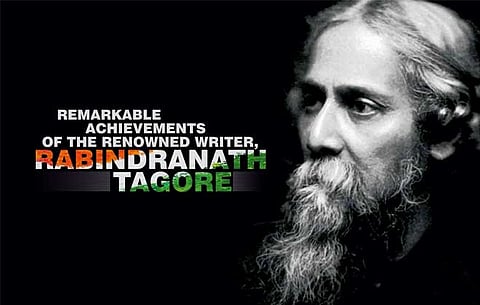
- News
- Women
- Magazine
- IndustryIndustry
- InsightsInsights
- Success Stories
- PublishPublish
- ContactContact
- Media KitMedia Kit

Remarkable Achievements of the Renowned Writer, Rabindranath Tagore
Rabindranath Tagore was a famous Indian Bengali writer; he was a prolific writer and influential artist and a musician at the same time. He was born on May, 7 1861 and died on August 7, 1941. Tagore was a multi-talented personality with a strong desire to learn new things. He was also an educationist who established Viswa Bharati University. His contributions to the literature, music and other works are memorable.
A versatile genius, Rabindranath Tagore, changed the landscape of Bengali literature, music, and art. Let's honor his remarkable contributions by exploring his major achievements and accomplishments:
Rabindranath Tagore won the Nobel Prize in Literature in 1913, and he was the first Indian as well as Asian to win Nobel Prize. He wrote eight novels, four novellas and a wide collection of poetry.
The National Anthem of India was written by Rabindranath. The first time, the poem was sung on the second day of the annual session of the Indian National Congress in Calcutta on 27 December 1911. After independence, the first stanza of the poem was adopted as the National anthem. And, it became known as Jana Gana Mana.
Apart from India's national anthem, Rabindranath also panned the national anthem of Bangladesh. In 1905, he wrote the song Amar Shonar Bangla during the British partitioning of Bengal, a time of national unrest. In 1971, when Bangladesh won its liberation war, the first ten lines of Amar Shonar Bangla were adopted as the National anthem in Bangladesh. Additionally, the national anthem of Sri Lanka was inspired by one of his works.
Tagore introduced the short story genre to Bengali Literature. In 1877, he wrote a short story titled Bhikharini. It was the first short story written in the Bengali language. The best known short story of Rabindranath was Kabuliwala.
In 1915, British crowned Tagore with Knight Title. But after the Jallianwala Bagh incident, he refused to keep the title at 1919 to protest the terror.
Deeply inspired to restructure the education system in India, Rabindranath took the foundation of an experimental school in Santiniketan. Here, he introduced a unique curriculum, which revolved around nature with classes. Later, the institution was expanded into a university named Visva Bharti University, today it is one of the most famous institutions of higher learning in the country.
In 1940, he was awarded by Oxford University with a Doctorate of Literature in a special ceremony arranged at Shantiniketan.
He painted over 3,000 paintings in the last 13 years of his life. It shows his creative power even his old age.
Tagore was also a prolific songwriter. He wrote approx. 2,230 songs in his whole life. And, Tagore is considered a major force in transforming the style of Bengali music by incorporating influences from different musical traditions.
Rabindranath Tagore was born on May 7, 1861, in Calcutta to Debendranath Tagore and Sarada Devi. His family was well-known for their talents in various fields. Raised in an environment rich in cultural and intellectual activities, Rabindranath was exposed to literature, music, and theater from a young age. His father, Debendranath Tagore, was a prominent figure in the Brahmo Samaj, a religious movement in Bengal.
Rabindranath's education started in England at a public school in Brighton, where his father sent him with the intention of becoming a barrister. However, Rabindranath was not fond of conventional schooling and preferred exploring literature, including the works of Shakespeare, on his own. He briefly attended University College London but left to pursue his interests independently. Upon his return to India, he married Mrinalini Devi at a young age.
Rabindranath Tagore later founded Visva Bharati University in Shantiniketan, where he was affectionately called "Gurudev" by his students. This institution emphasized a holistic approach to education, welcoming students from all backgrounds. Classes were often held outdoors under the shade of large banyan trees, fostering a unique learning environment.
Despite his literary and cultural contributions, Rabindranath Tagore was also politically engaged. He criticized British rule and was vocal about the shortcomings of his fellow Indians. In a notable act of protest against the Jallianwala Bagh Massacre, he renounced his knighthood. His love for his country and its people transcended personal acclaim or material gain, reflecting his deep patriotism and social consciousness.
